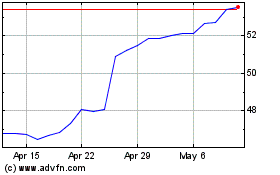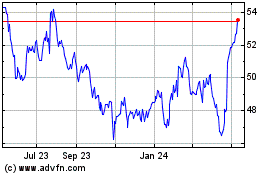By Saabira Chaudhuri and Annie Gasparro
It's mayhem in the mayonnaise aisle.
Hellmann's maker Unilever PLC and Kraft Heinz Co., which owns
Miracle Whip, are cutting prices and slinging out new concoctions
as they battle changing eating habits, a dizzying array of new
players and each other.
The two, which together account for more than 80% of U.S.
mayonnaise sales, are duking it out because they are at risk of
losing shelf space to faster-growing rivals.
U.S. sales of mayonnaise fell 6.7% between 2012 and 2017,
according to Euromonitor. Small mayonnaise brands, though, which
made up just 3.2% of the market six years ago, have almost doubled
their share and last year made up 6.1%.
Niche brands have elbowed into many supermarket categories,
marketing themselves as healthier than traditional packaged,
processed foods. Grocers are offering their own house labels. And
an explosion of specialty and flavored mayonnaises and other new
condiments is shaking up the sandwich staple, which until recently
hadn't changed much in more than a century.
"Condiments are more competitive than they've ever been," said
Jennifer Healy, head of marketing for the Heinz brand. "Ten years
ago, it was much more simple."
Miracle Whip and Kraft Mayo, Kraft Heinz's other big mayonnaise
brand, have been squeezed between cheaper offerings on one end, and
Hellmann's and other premium brands on the other. Miracle Whip --
which doesn't call itself "mayonnaise" because its oil content
doesn't match food regulators' definition -- lost almost 1
percentage point of U.S. market share between 2015 and 2017. It and
Kraft Mayo have just over 30% of the market, according to
Euromonitor.
Ms. Healy said Kraft Heinz is engaged in a major mayo push, last
month launching a new brand -- Heinz Mayo -- which uses simple
ingredients and cage-free eggs. The company also is developing a
mayonnaise-ketchup combination that it is calling "mayochup."
Hellmann's, called Best Foods west of the Rockies, has raced
ahead. While overall mayonnaise sales have declined, it boosted its
U.S. market share by 3.5 percentage points in the past three years
and now has just over 50% of the U.S. market.
Hellmann's and Kraft Mayo have come out with new flavors and
variations, like avocado-oil mayonnaise and roasted garlic and
spicy chipotle flavors. Kraft revamped the Miracle Whip recipe last
year, going back to its original ingredients and replacing high
fructose corn syrup with sugar. "It was a huge investment for us,"
said Eduardo Luz, president of Kraft Heinz's U.S. grocery
business.
But the big brands have lost some cachet. Beverley Tanel, a
Dallas-area mother of three, said she used to buy both Miracle Whip
and Hellmann's mayonnaise to use in different recipes. "They each
have their place," she said.
But she hasn't been buying as much lately. "I've gone away from
it for health reasons," Ms. Tanel said. Instead, her 16-year-old
daughter has her buying avocado-oil mayonnaise from a small brand
called Primal Kitchen, which markets its mayonnaise as sugar-free
and canola-free, among other things.
The stakes are high for Big Mayo. Condiments rank among the top
10 most profitable types of food to manufacture, according to
market research firm IBISWorld. Mayonnaise ingredients -- basically
oil, water, eggs and vinegar -- are cheap. Giant companies that
have made and marketed mayonnaise for years can "reduce cost and
improve margins," said Manny Picciola, a partner at L.E.K.
Consulting.
The extra profit is important at a time when packaged-food sales
generally are slowing. And Americans still eat a lot of mayo --
whether on sandwiches or in things like potato salad and chicken
salad. Excluding salad dressing, mayo is the country's biggest
"table sauce" by volume and sales value, according to Euromonitor,
beating even ketchup.
To keep customers and lure new ones, Unilever and Kraft Heinz
have been offering discounts. Mayonnaise prices for the first
quarter fell 0.6% versus a year ago, while overall packaged food
prices were 1.6% higher, according to Nielsen.
"Kraft went down in price and Hellmann's followed," said Wayne
Spencer, president of promotional planning company T-Pro
Solutions.
"We're engaging toe to toe," Unilever Chief Financial Officer
Graeme Pitkethly said on a recent investor call. Kraft Heinz's Ms.
Healy said, "We've been consistent on how we promote, and we
promote less than our competitors."
Both sides are also advertising heavily. A TV spot for Kraft
Heinz's new Heinz mayonnaise takes a swipe at "yesterday's brand,"
a jar with a blue top just like Hellmann's.
Unilever and Kraft Heinz's battle is spilling into other
condiments, too. Hellmann's last month launched "Hellmann's real
ketchup" in the U.S.; it is sweetened using honey instead of high
fructose corn syrup. Heinz recently started selling its own
honey-sweetened ketchup.
"We saw this as an opportunity to elevate an American staple,"
said Russel Lilly, marketing director of Hellmann's. "It's time for
ketchup to evolve."
Not everyone agrees. "It tasted like weak barbecue sauce," said
Orlando, Fla.-based food blogger James Emerson, who picked up a
bottle of honey-sweetened ketchup at his local grocery store last
month. "This just don't seem right."
Write to Saabira Chaudhuri at saabira.chaudhuri@wsj.com and
Annie Gasparro at annie.gasparro@wsj.com
(END) Dow Jones Newswires
May 20, 2018 09:14 ET (13:14 GMT)
Copyright (c) 2018 Dow Jones & Company, Inc.
Unilever (NYSE:UL)
Historical Stock Chart
From Mar 2024 to Apr 2024

Unilever (NYSE:UL)
Historical Stock Chart
From Apr 2023 to Apr 2024
